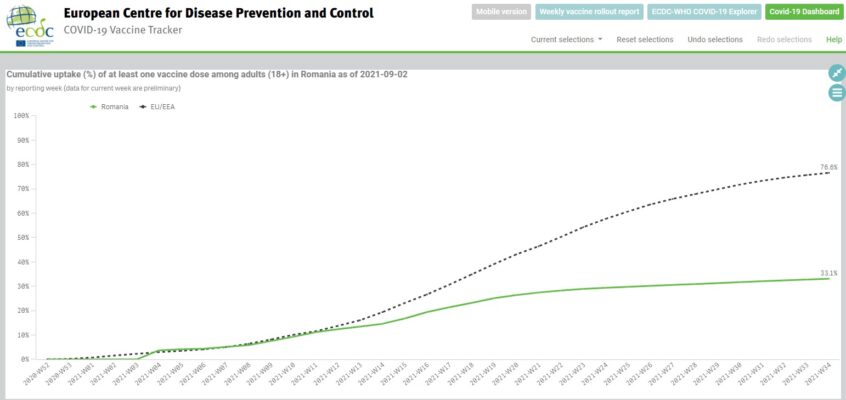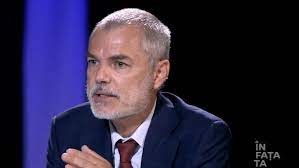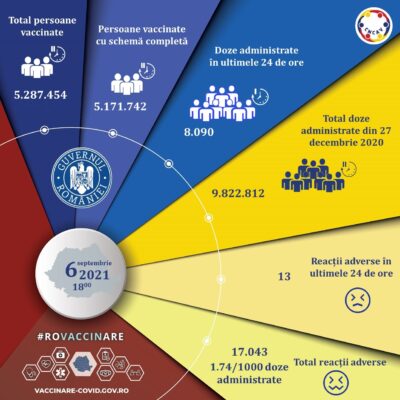It has started so well. Romania kept pace with the EU average in springtime, but quickly hit a wall. Now, with just one in three people vaccinated, the country has sold unused vaccines to Denmark, Ireland and South Korea before they go out of date.
Doctors are working around the clock to increase vaccine uptake while hospitals are filling up with people infected by the delta variant of SARS-CoV-2. To make matters worse, police have uncovered multiple cases of people using fake vaccine certs to mix freely in public places.
The warning signs were there from the start. Romania has been at the centre of Europe’s measles outbreaks, prompting the government to consider (but not implement) mandatory childhood vaccination. Uptake of flu vaccines is abysmal, at just 16%. There is also a strong history of vaccine misinformation circulating on social media.

However, when it comes to COVID-19 vaccine uptake, a troubled past does not necessarily predict shaky uptake rates. France, often a hotbed of anti-vaccine sentiment, has stellar COVID-19 vaccination rates of 92% (1 dose). Lithuania, where flu vaccine uptake is lower than in Romania, has vaccinated more than 70% of adults.
In Romania, 33% have had their COVID-19 vaccine. Vaccination rates tracked the EU average for months but sharply decoupled in the summer while France, Denmark, Malta, Ireland and Portugal raced ahead. Near neighbours in Hungary, Slovakia and Poland are also below the European average, but are well ahead of Romania. Only Bulgaria, where 22.5% have had a COVID-19 vaccine, is performing worse.
Some sources argue that vaccination rates in Romania and Bulgaria are distorted by the large numbers of their citizens living abroad. The denominator is inflated, they suggest, because millions of people officially registered in Romania actually live (and may have been vaccinated) in other European countries.

So, perhaps things are not as bad as they look? ‘The reality is actually worse,’ says Dr Mihai Craiu, a paediatrician in Bucharest. ‘New concerns are emerging: after a surge of admissions to intensive care units of people who were supposedly ‘fully-vaccinated’, we see mounting cases of fraud and fake vaccine documents.’
Prof Cristian Oancea, a leading expert in lung diseases in Timisoara, was among the first to raise the alarm. He said some patients arrive at doctors’ offices demanding certificates but are unwilling to be vaccinated. Many doctors refuse but some comply with the request.
‘Sink vaccines’
Following a police investigation, it emerged that a GP in Dambovita country had provided fake vaccine documents for a local football team, of which her husband was the manager. It is alleged that the doctor poured the vaccines down the sink and issued certificates stating that players were vaccinated. This has led to the term ‘sink vaccines’ coming into public discourse.
It was not an isolated incident. Ioana Mihaila, Romania’s Health Minister, said more than 370 cases of fraudulent vaccine certificates had been reported to the police. In some cases, Romanian doctors had faked the certificates; in others, Romanian citizens living abroad, or travelling regularly, were found to have suspicious documents.

Faced with rising cases of the delta variant of SARS-CoV-2, doctors are worried. For those who had spent days administering vaccines as part of a ‘vaccine marathon’ earlier this year, antipathy to vaccination is particularly heartbreaking.
Dr Craiu says access to vaccination has not been an issue in Romania. With the support of military logistics teams and public procurement teams, hundreds of vaccine hubs have been set up and incentives offered to the public.
‘When the decline in vaccine coverage started, doctors from Carol Davila Medical University organised a Vaccine Marathon which allowed people to arrive any time to avail of a free vaccine over one weekend in May,’ he recalls. ‘It was a lot of work but with the help of 1,300 volunteers [nurses, doctors and students], we immunised more than 20,000 people in one weekend.’

Anti-vaccine content on social media is part of the problem, says Dr Craiu, whose Facebook page has more than 230,000 followers. Many vaccine-sceptical voices can be found in online and traditional media, he says, with just a handful of cases where anti-vaccine doctors have been investigated by officials or medical bodies.
Now Romania is turning to influencers and religious figures to help turn the tide before winter arrives, potentially ushering in flu season just as the delta wave peaks in central and eastern Europe.
‘Maybe this wave will increase coverage a little,’ says Dr Craiu, who won a 2018 Vaccines Today contest to find Europe’s immunisation communication champions. ‘But there is a general distrust of authorities and I’m not convinced that major changes will happen soon. Even aside from COVID-19, vaccine hesitancy is very high here.’





Pingback
September 13th, 2021
[…] Read more @ http://www.vaccinestoday.eu […]
Pingback
September 13th, 2021
[…] Read more @ http://www.vaccinestoday.eu […]
Pingback
September 13th, 2021
[…] Read more at http://www.vaccinestoday.eu […]
Radu
October 20th, 2021
I think they are just shocked and impressed that Romania and Bulgaria are the smartest people by saying NO VACCINS AND CERTIFICATE
Pingback
October 27th, 2021
[…] seen numerous participants protesting against the pandemic-related restrictions. After a promising start to the country’s vaccination campaign, the vaccination rate significantly slowed down during the […]
Dana
October 30th, 2021
Exactly! WE must thank to Ceausescu . Due to his patriotic ### people were forced to entertain with books ! We learnt how to use our brains and not be told what to think ! The Western World created a poor education system and new generations of illiterates! The more you go further from Europe the worse it gets. Americans have no basic knowledge of history or Geography. Australians think the world started with Thomas Cook and Aboriginals were the greatest ancient population to have existed . Watch the movie “Idiocracy” and you will realize it’s not SF but our future…
Aida Zaharia
November 5th, 2021
Te iubesc, Dana!!!!
Pingback
November 1st, 2021
[…] report patients asking for sham vaccination certificates, and a new term has entered the language: “sink” vaccinations, so-called because the contents of the syringe go down the drain, not into an […]
Pingback
November 1st, 2021
[…] report patients asking for sham vaccination certificates, and a new term has entered the language: “sink” vaccinations, so-called because the contents of the syringe go down the drain, not into an […]
Pingback
November 17th, 2021
[…] participanți care protestează împotriva restricțiilor legate de pandemie. După o promisiune start în timpul campaniei de vaccinare a țării, rata de vaccinare a scăzut considerabil în timpul […]
Pingback
December 2nd, 2021
[…] Leading medical figures and politicians attributed vaccine skepticism to a lack of ‘information, education, communication’ (the new public health’s ‘IEC’ approach!), which is allegedly rampant among less educated, rural and older Romanians. The vice-chairman of the Romanian Society of Anaesthesia and Intensive Care explained the low uptake of vaccination as being the result of ‘national blindness, caused by the lack of education, by the lack of civilisation.’ Public commentators contrasted this ‘lack of education and understanding’ on behalf of the population with the success of the government’s vaccination campaign in ‘efficiently managing to make vaccination easily accessible.’ […]
Pingback
January 14th, 2022
[…] https://covidnews.eurocities.eu/2020/05/08/kartal-istanbul-recycled-entertainment/ https://www.vaccinestoday.eu/stories/romanias-covid-19-vaccine-goes-off-the-rails/ […]
Pingback
January 20th, 2022
[…] il contenuto della siringa viene gettato nel lavandino invece che essere iniettato. È successo nel distretto di Dâmbovița, 80 chilometri a nordovest della capitale. Ma non è un caso isolato: casi di frode e […]
Pingback
May 29th, 2022
[…] părinților față de vaccinări sunt influențate de dezinformare. Acest lucru se reflectă în Adoptarea de către România a COVID-19 vaccinuri printre cele mai slabe din Europa. Întrucât 42% dintre oameni din România au primit […]
Pingback
February 19th, 2024
[…] Leading medical figures and politicians attributed vaccine skepticism to a lack of ‘information, education, communication’ (the new public health’s ‘IEC’ approach!), which is allegedly rampant among less educated, rural and older Romanians. The vice-chairman of the Romanian Society of Anaesthesia and Intensive Care explained the low uptake of vaccination as being the result of ‘national blindness, caused by the lack of education, by the lack of civilisation.’ Public commentators contrasted this ‘lack of education and understanding’ on behalf of the population with the success of the government’s vaccination campaign in ‘efficiently managing to make vaccination easily accessible.’ […]